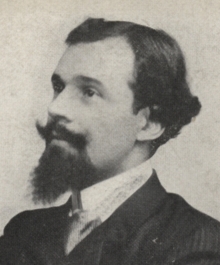Pierre Brizon
| Pierre Brizon | |
|---|---|
 |
|
| Born |
16 May 1878 Franchesse, Allier, France |
| Died | 1 August 1923 (aged 45) Paris, France |
| Nationality | French |
| Occupation | Teacher, politician |
| Known for | Pacifism |
Pierre Brizon (16 May 1878 - 1 August 1923) was a French teacher, national deputy, internationalist and pacifist. He was subject to violent attacks in the press and parliament for speaking out against the fighting during World War I.
Pierre Brizon was born on 16 May 1878 in Franchesse, Allier, to a poor farming family. He was a gifted student, and qualified as a teacher, moving from one teaching position to another at the start of his career. He became a teacher of the national professional schools, and was appointed to a position in Armentières, Nord department. There he joined the Socialist group. He supported the struggles of workers, and wrote various articles for socialist publications. In 1905 he wrote in praise of the sailors of the Battleship Potemkin uprising, and received a letter from Bienvenu Martin, minister of public education, reproving him for not having used the reserved language required of public servants, and particularly of teachers. Around this time he also wrote a lengthy history of labor.
He became a teacher at the Rennes industrial school. In the legislative elections of 1906 he was a candidate in Grenoble on the platform of the Socialist Party (SFIO, Section Française de l'Internationale Ouvrière). He was not elected, perhaps because he had no ties to the region. In 1907 he was elected a councilor in the district of Bourbon-l'Archambault, Allier. Later he would become mayor of his native town.
Brizon was elected a national deputy for Allier in April 1910 on the socialist platform. He demanded pensions for workers, nationalization of insurance, mines, railways and progressive inheritance and income taxes. He was reelected in 1914. He was noted for his defense of the rights of tenant farmers. After the outbreak of World War I (July 1914 - November 1918) Brizon joined the union sacrée whose members agreed to cooperate with the government, as did all members of the Socialist party. Later he became opposed to the union sacrée, and joined the pacifist Comité pour la reprise des relations internationales (Committee for restoring international relations).
...
Wikipedia
